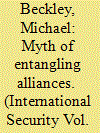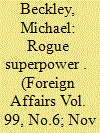|
|
|
Sort Order |
|
|
|
Items / Page
|
|
|
|
|
|
|
| Srl | Item |
| 1 |
ID:
158535


|
|
|
|
|
| Summary/Abstract |
Japan's remarkable postwar growth spurt in the 1960s would not have been possible without Japan's alliance with the United States. Policy makers, political scientists, economists, historians, and journalists on both sides of the Pacific have made this claim, but no study has yet tested it with modern statistical methods. In this article, we compare the economic growth trajectories of Japan and a statistically constructed “synthetic” Japan, which had a similar profile until the late 1950s but did not experience the consolidation of the US–Japan alliance, a process that began in 1958 and culminated with the signing of a formal defense pact in January 1960. We find that Japan's per capita gross domestic product (GDP) grew much faster than the synthetic Japan's from 1958 to 1968. We substantiate these results with in-depth historical analyses on how the United States facilitated Japan's economic miracle.
|
|
|
|
|
|
|
|
|
|
|
|
|
|
|
|
| 2 |
ID:
108841


|
|
|
|
|
| Publication |
2011-12.
|
| Summary/Abstract |
Two assumptions dominate current foreign policy debates in the United States and China. First, the United States is in decline relative to China. Second, much of this decline is the result of globalization and the hegemonic burdens the United States bears to sustain globalization. Both of these assumptions are wrong. The United States is not in decline; in fact, it is now wealthier, more innovative, and more militarily powerful compared to China than it was in 1991. Moreover, globalization and hegemony do not erode U.S. power; they reinforce it. The United States derives competitive advantages from its hegemonic position, and globalization allows it to exploit these advantages, attracting economic activity and manipulating the international system to its benefit. The United States should therefore continue to prop up the global economy and maintain a robust diplomatic and military presence abroad.
|
|
|
|
|
|
|
|
|
|
|
|
|
|
|
|
| 3 |
ID:
155882


|
|
|
|
|
| Summary/Abstract |
Many analysts argue that China will soon dominate East Asia militarily. In reality, China is far from achieving this goal and will remain so for the foreseeable future. China's maritime neighbors have developed antiaccess/area-denial (A2/AD) capabilities that can deny China sea and air control throughout most of its near seas, and China cannot afford the power-projection capabilities it would need to overcome these A2/AD forces. This regional balance of power enables the United States to preserve the territorial status quo in East Asia at moderate cost and risk to U.S. military forces.
|
|
|
|
|
|
|
|
|
|
|
|
|
|
|
|
| 4 |
ID:
138168


|
|
|
|
|
| Summary/Abstract |
For the first 165 years of its history, the United States did not form any alliances besides the one it signed with France during the Revolutionary War. Instead, U.S. leaders followed George Washington’s advice to “steer clear of permanent alliance with any portion of the foreign world, a recommendation subsequently enshrined in Thomas Jefferson’s inaugural pledge: “Peace, commerce, and honest friendship with all nations; entangling alliances with none.”
|
|
|
|
|
|
|
|
|
|
|
|
|
|
|
|
| 5 |
ID:
192032


|
|
|
|
|
| Summary/Abstract |
From ancient times to the present, rising powers have taken up arms to reorder the world. Yet such violent revisionism poses a puzzle: If a rising power is profiting from the existing order, why would it disrupt that progress with a reckless fit of expansion? One reason is slowing economic growth. Over the past 150 years, peaking powers, meaning rising powers whose economic booms have slowed but not yet stopped, have been the most dangerous kind of country. An extended period of rapid growth equipped them with the means to shake up the world, and then a protracted growth slowdown motivated them to move aggressively to try to rekindle their rise. Peaking power dynamics help explain some of the most consequential geopolitical events in modern history, including the surge of U.S. imperialism in the late nineteenth century, the outbreak of World War II, and Russia's 2014 aggression against Ukraine. These findings amend classic theories of great power conflict and have ominous implications for contemporary Chinese foreign policy.
|
|
|
|
|
|
|
|
|
|
|
|
|
|
|
|
| 6 |
ID:
162674


|
|
|
|
|
| Summary/Abstract |
Power is the most important variable in world politics, but scholars and policy analysts systematically mismeasure it. Most studies evaluate countries’ power using broad indicators of economic and military resources, such as gross domestic product and military spending, that tally their wealth and military assets without deducting the costs they pay to police, protect, and serve their people. As a result, standard indicators exaggerate the wealth and military power of poor, populous countries, such as China and India. A sounder approach accounts for these costs by measuring power in net rather than gross terms. This approach predicts war and dispute outcomes involving great powers over the past 200 years more accurately than those that use gross indicators of power. In addition, it improves the in-sample goodness-of-fit in the majority of studies published in leading journals over the past five years. Applying this improved framework to the current balance of power suggests that the United States’ economic and military lead over other countries is much larger than typically assumed, and that the trends are mostly in America's favor.
|
|
|
|
|
|
|
|
|
|
|
|
|
|
|
|
| 7 |
ID:
175222


|
|
|
|
|
|
|
|